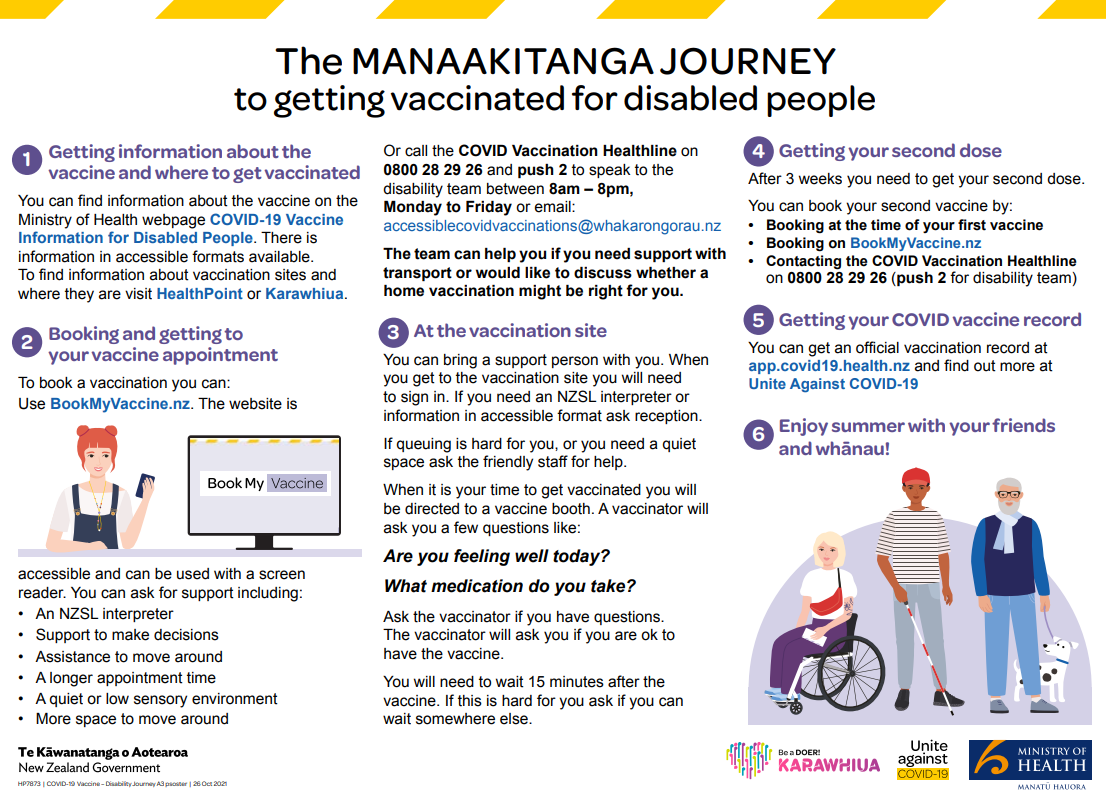Pfizer COVID-19 vaccine
Also called the Pfizer/BioNTech vaccine or Comirnaty vaccine
Key points about the Pfizer COVID-19 vaccine
- The Pfizer COVID-19 vaccine protects against the COVID-19 virus.
- It protects you from severe infection, hospitalisation and death.
- Find out about the vaccine and possible side effects.

The Pfizer vaccine protects against COVID-19. Vaccination means that if you do become infected you're far less likely to become seriously ill, need to go to hospital or spread the virus to others.
The vaccine stimulates your body’s immune system to produce antibodies to help fight the virus that causes COVID-19. None of the ingredients in this vaccine can cause COVID-19.
Video: What is the Pfizer-BioNTech vaccine? (English version)
(Ministry for Pacific Peoples, NZ, 2021)
Watch this video in:
- Lea Faka Tonga(external link)
- Gagana Samoa(external link)
- Te reo Māori Kuki ‘Āirani | Cook Islands Māori(external link)
- Te Gagana Tokelau | Tokelau(external link)
- Fäeag Rotųam | Rotuma(external link)
- Vagahau Niue | Niue(external link)
- Te taetae ni Kiribati | Kiribati(external link)
- Vosa Vakaviti | Fijian(external link)
Watch this video on how the Pfizer/BioNTech COVID-19 mRNA vaccine works (te reo Māori audio).
(The Immunisation Advisory Centre, NZ, 2021)
Watch this video in:
Tamariki, including those with weakened immune systems, can get the children’s version of the Pfizer vaccine. This is a lower dose and a smaller volume than the adult version. Read more about Pfizer COVID-19 vaccine in children 5 years old and over.
Adults and children 12 years and older can receive 2 doses of the adult version of the vaccine, at least 3 weeks apart.
- People who are severely immunocompromised may also be eligible for an additional primary dose (3 doses) and, depending on their age, a second booster dose. Read more about the COVID-19 vaccine for immunocompromised people.
- Booster dose: Anyone 30 years of age and over and people at higher risk of severe illness from COVID-19, can receive an additional booster if it has been at least 6 months since their last booster or COVID-19 infection. Read more about the COVID-19 vaccine booster.
There is information below about how many doses of the Pfizer vaccine you need.
Yes, you should start, or continue, with your vaccinations 6 months after you've recovered from COVID-19. Being vaccinated provides better protection than any immunity you might get from being infected with the virus. It can also help protect you from new variants of COVID-19.
The Pfizer vaccine is given as an injection into the muscle of your upper arm by a trained healthcare provider.
- You will need to stay for at least 15 minutes afterwards so a healthcare worker can look out for you and make sure you're okay.
- Then, if you're fine and you're feeling okay, you can leave and carry on with your day.
The number of doses you need and the gap between the doses will depend on whether you are getting your first, second or your booster doses and whether you have a weakened immune system or not. Read more about the recommended timing gaps for different COVID-19 vaccines.(external link)
You shouldn't receive the Pfizer vaccine if you have had a severe allergic reaction (anaphylaxis) to this vaccine or its ingredients.
Yes, you are strongly encouraged to be vaccinated against COVID-19 at any stage of pregnancy. A Medsafe review of the use of the Pfizer vaccine in pregnancy(external link) found no safety concerns, and it's been given to many thousands of people during pregnancy throughout the world. Read more about COVID-19 vaccination and pregnancy.
There are also no safety concerns about giving the Pfizer vaccine to people who are breastfeeding. By being vaccinated, you can provide some protection against COVID-19 for your baby through your breastmilk. Read more about the use of the Pfizer vaccine in pregnancy and breastfeeding.(external link)
Like all vaccines, the Pfizer vaccine can cause side effects, although not everyone gets them. It's important to drink plenty of fluids after your vaccination, and to rest. Avoid going to the gym or strenuous exercise for a day or two afterwards. Side effects are more commonly reported after a second dose.
| Side effects | What should I do? |
|
|
|
|
|
|
Read more about medicines and side effects and reporting a reaction you think might be a side effect.
Serious allergic reactions can occur but they are extremely rare. New Zealand vaccinators are trained to manage these. Most people with a history of anaphylaxis to other medicines, vaccines, foods and venom can be safely vaccinated.
Signs of an allergic reaction include skin rash, itching, swelling of your lips, face and mouth, or difficulty breathing or speaking.
- A trained healthcare provider will observe you for at least 15 minutes after being given the Pfizer vaccine.
- If these symptoms develop after that, go straight to the emergency department at your nearest hospital, or call 111 if your hospital's not nearby.
Delayed allergic symptoms
Some people develop delayed allergic symptoms such as swelling around your eyes or face, hives or a rash. This can develop from a few hours to days after getting your vaccine. The symptoms may settle on their own without treatment or you can use antihistamine tablets (eg, cetirizine or loratadine). Tell your doctor if you're concerned.
Most people who develop delayed allergic symptoms with the first dose can safely get the second dose. You can take an antihistamine (eg, cetirizine or loratadine) prior to or following the second dose. Most people will have a similar milder reaction with the second dose.
Myocarditis is inflammation affecting the heart muscle. Pericarditis is inflammation of the lining around the heart. Myopericarditis is a mixture of myocarditis and pericarditis.
There have been very rare reports of myocarditis, pericarditis or both (myopericarditis) occurring after vaccination with the Comirnaty Pfizer COVID-19 vaccine particularly in younger males. Myocarditis is more likely to occur following a COVID-19 infection than after receiving the vaccine.
Although this side effect is rare, it can be serious. Symptoms of myocarditis or pericarditis linked to the vaccine generally appear within a few days, and mostly within the first few weeks after having the vaccine. Read more about COVID-19 vaccine side effects and reactions(external link).
Seek medical attention if you experience any of the following in the first few weeks after your vaccination.
|
For the latest reports on adverse events following immunisation with COVID-19 vaccines, see overview of vaccine reports.(external link)
Getting COVID-19 vaccines(external link) Health New Zealand | Te Whatu Ora
References
- Comirnaty COVID-19 vaccine(external link) Medsafe Consumer Information, NZ
- Comirnaty(external link) European Medicines Agency
- Myocarditis, pericarditis and the COVID-19 vaccines in New Zealand – information for health professionals(external link) The Immunisation Advisory Centre, NZ
Brochures

Ministry of Health and Unite against COVID-19, NZ, 2021

Medicines and side effects
Healthify He Puna Waiora, NZ, 2024

Health Quality and Safety Commission, NZ, 2019
Credits: Sandra Ponen, Pharmacist, Healthify He Puna Waiora. Healthify is brought to you by Health Navigator Charitable Trust.
Reviewed by: Stephanie Yee, Pharmacist, Auckland
Last reviewed:





